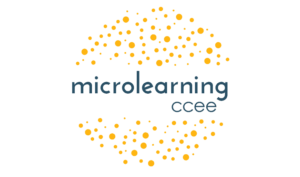Find the Resource
You Want
Sort through all available resources to find a microlearning opportunity that suits your needs. Finding a great resource is quick and easy: click on the categories you want or search for a term you would like to learn more about.
Don’t forget to bookmark this page and come back later as more resources are constantly being added.

Search and Filter
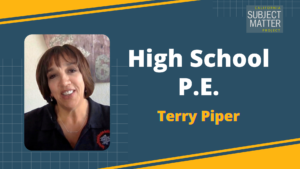
High School P.E.
Terry Piper shares best practices and tips for anyone wishing to teach High School P.E. (This is the fourth video of the four-part Physical Education video collection.)
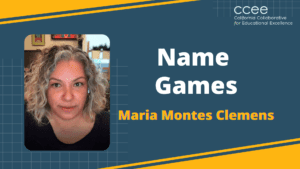
Name Games
Maria Montes Clemens shares three name learning games to help you create relationship with students and improve classroom management. In this video, you will learn about the “Name and Personal
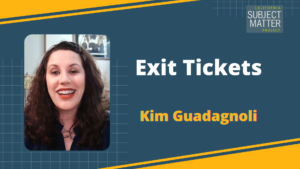
Exit Tickets
Kim Guadagnoli, theater teacher at Grand Terrace High School, tells us how to use the “Exit Ticket” strategy to help students review and reflect on their learning.
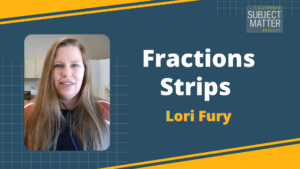
Fractions Strips
Lori Fury, math teacher in Western Placer Unified School District, tells us how to use the “Fraction Strips” activity to help students build their understanding of what a fraction is
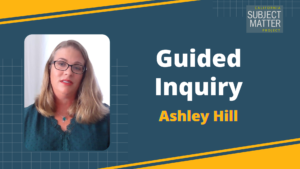
Guided Inquiry
Learn how to use the “Guided Inquiry” process as an engaging way to introduce a new topic and promote higher-level thinking with students.
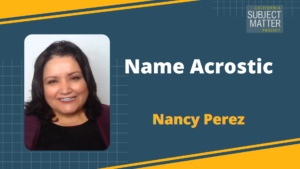
Name Acrostic
Nancy Perez, Spanish teacher at El Diamante High School, tells us how to use the “Name Acrostic” activity to encourage students to talk about and share their identity in a

Partner Talk: “I am, I Can”
Valerie Sun, teacher specialist at Glendale Unified School District, tells us how to apply the “Partner Talk” strategy to help students practice using instructional language to talk about themselves in
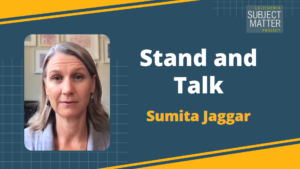
Stand and Talk
Sumita Jaggar, teacher leader with the Monterey Bay Area Math Project, tells us how to use the “Stand and Talk” activity to engage students in conversations about math concepts or
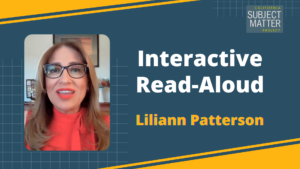
Interactive Read-Aloud
Dr. Liliann Patterson, third grade teacher at Westmorland Union Elementary, tells us how to use the “Interactive Read-Aloud” activity to help students learn, use, and practice new language through meaningful
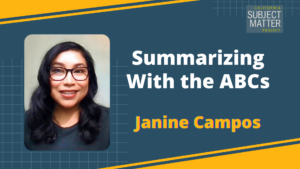
Summarizing with the ABCs
Janine Campos, language arts specialist in the National School District, tells us how to use the “Summarizing with the ABCs” activity to help students identify and differentiate between the minor
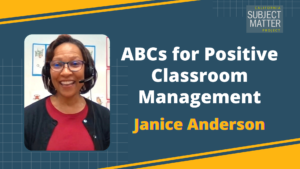
ABCs for Positive Classroom Management
Janice Anderson, a primary grade resource teacher at Encanto Elementary School, tells us how to apply the “ABCs for Positive Classroom Management” strategies to create a safe learning environment that
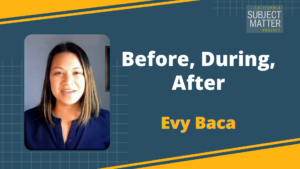
Before, During, After
Evy Baca, kindergarten teacher in the National School District, tells us how to incorporate the “Before, During, and After” activity when doing a read aloud to build students’ vocabulary and
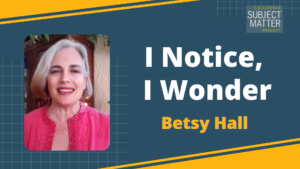
I Notice, I Wonder
Betsy Hall, K-5 reading specialist at Albert Einstein Academy Charter Elementary School, tells us how to apply the “I Notice, I Wonder” strategy to help teachers make a read aloud
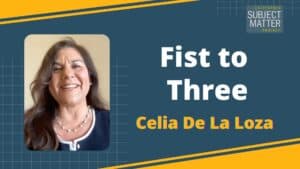
Fist to Three
Celia De La Loza, TK-5 teacher at Valencia Academy of the Arts, tells us how to apply the simple “Fist to 3” strategy to help teachers quickly gauge student understanding
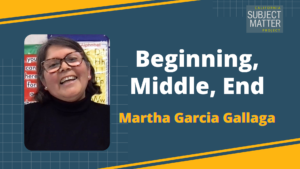
Beginning, Middle, End
Martha Garcia Gallaga, TK English teacher at Las Palmas Elementary School, tells us how to use the “Beginning, Middle, and End” activity after a read aloud to help TK-1st
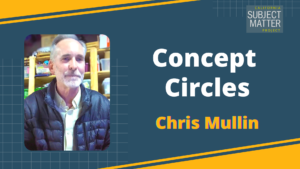
Concept Circles
Chris Mullin, high school history teacher in the Santa Ynez Valley Union High School District, tells us how to leverage the “Concept Circles” activity to help students communicate their understanding
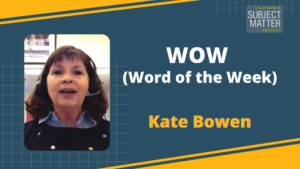
WOW (Word of the Week)
Kate Bowen, retired elementary school teacher for the Davis Joint Unified School District, tells us how to use the “WOW (Word of the Week)” activity to channel students’ creativity in
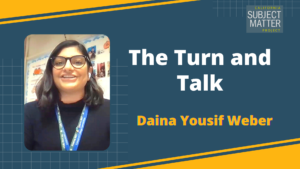
The Turn and Talk
Daina Yousif Weber, English and AVID teacher in San Diego Unified School District, tells us how to apply the “Turn and Talk” strategy to empower students to make their own
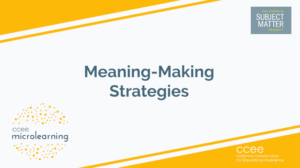
Meaning-Making
Experts from the California Subject Matter Project (CSMP) share 3 meaning-making strategies you can use to engage students in your classroom.
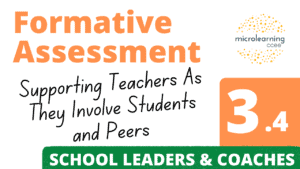
Formative Assessment 301 – Part 4: Supporting Teachers As They Involve Students and Their Peers
In order to gather information that is useful for making better educational decisions, evidence of student understanding or learning must be collected. Watch this video for a primer on assessments
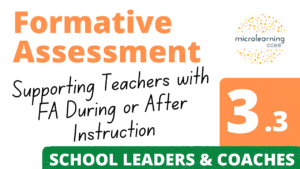
Formative Assessment 301 – Part 3: Suporting Teachers with Formative Assessment During or After Instruction
In this module, school leaders will consider how to examine lesson learning intentions and how effective discussions, tasks, and activities can be engineered to elicit evidence of student learning. The

Formative Assessment 301 – Part 2: High Quality Discussion with Teachers
In this module, we are going to discuss three tools and resources that can be used to move teacher practice forward with respect to formative assessment processes: 1) Student Work
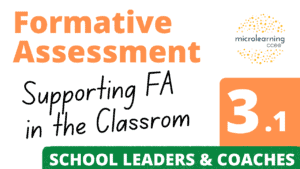
Formative Assessment 301 – Part 1: Supporting Formative Assessment in the Classroom
This first module begins with an overview of the formative assessment process and serves as an advanced introduction to supporting high-quality formative assessment processes in the classrooms.

Formative Assessment 301 – Introduction
Welcome to the Introduction to Micro-Course 3. This module will provide you with the information you will need to understand the intended audience, guiding questions, organization, and proposed uses of
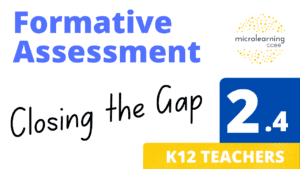
Formative Assessment 201 – Part 4: Closing the Gap
This module focuses on the last two aspects of Dylan Wiliam’s framework related to embedded formative assessment strategies: the role of the learner in activating their own learning and peers

Formative Assessment 201 – Part 3: How to Get There
This module focuses on the third aspect of Dylan Wiliam’s framework related to embedded formative assessment strategies: how to get there. This module discusses the role of the teacher in

Formative Assessment 201 – Part 2: Where the Learner is Going
This module focuses on the first aspect of Dylan Wiliam’s framework related to embedded formative assessment strategies: where the learner is going. We discuss the role of the teacher, peer,

Formative Assessment 201 – Part 1: Learning Acceleration (Advanced)
The first module of this micro-course begins with an overview of the formative assessment process and serves as an advanced introduction to key concepts for educators.

Formative Assessment 201 – Introduction (Advanced)
Welcome to the Introduction to Micro-Course 2. This module will provide you with the information you will need to understand the intended audience, guiding questions, organization, and proposed uses of
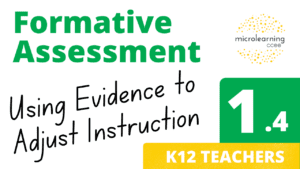
Formative Assessment 101 – Part 4: Using Evidence of Learning to Adjust Instruction
Key to the conversation in this module is the concept that formative assessment is a process that is inseparable from instruction. Formative assessment processes are the bridge between teaching and
